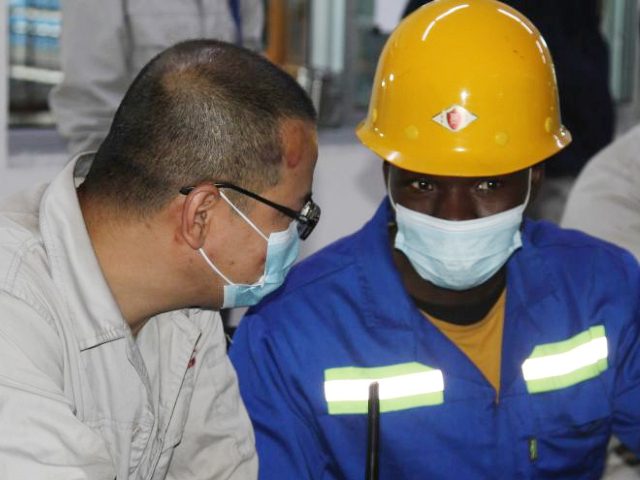African workers for Chinese-owned mines and factories across southern Africa told the Institute for Security Studies (ISS) in a report published Thursday that they regularly experienced various labor rights violations, including a lack of compensation for all hours worked and poor safety conditions.
ISS said on June 30 that it recently interviewed an unspecified number of employees and former employees of Chinese-owned companies throughout six southern African nations for an upcoming study. The interviews spanned Angola, the Democratic Republic of the Congo (DRC), South Africa, Lesotho, Zambia, and Zimbabwe.
Detailing some of the information gathered so far, ISS wrote:
[I]n general, interviewees who spoke to ISS field researchers raised concerns about labour rights violations and precarious employment conditions impacting the relationships between workers and Chinese employers.
In particular, wages, especially for low-skilled workers, remain low – sometimes below the sector’s minimum wage. And in some cases, employers don’t compensate workers for all hours worked.
Non-compliance with occupational health and safety legislation and procedures was also raised as a concern, particularly in the mining sector. This ranged from the lack of inadequate protective clothing and visible labelling of machinery and buildings to poor lighting and ventilation and scant company training programmes on safety policies.
ISS is a nonprofit based in South Africa that aims to “enhance human security as a means to achieve sustainable peace and prosperity,” according to the organization’s website.
The Chinese government’s Belt and Road Initiative (BRI) has allowed Beijing to establish a strong presence within the African economy in recent years. The program allows China’s ruling Communist Party to fund infrastructure projects in developing or lower-income nations. The BRI often uses predatory loan structures, which observers have criticized for their propensity to trap poor participants in cycles of debt. China has established various businesses, such as mines and textile factories, across African countries that have agreed to join its BRI. Chinese nationals who manage these businesses across Africa often clash with either their own African employees or other locals, sometimes over issues concerning labor conditions.
The Chinese manager of a gold mine in central Zimbabwe allegedly shot and injured two African ex-employees in June 2020 after the two men demanded back wages from the Chinese national and the dispute escalated. A court in western Rwanda sentenced Chinese national Sun Shujun to 20 years in prison in April after finding him guilty of torturing at least two African miners in August 2021 at a Chinese-owned mine managed by Sun. Both Zimbabwe and Rwanda are members of China’s BRI.

COMMENTS
Please let us know if you're having issues with commenting.